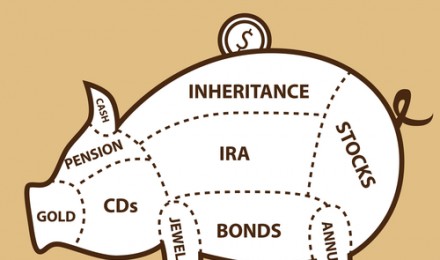Debt has become a way of life for the majority of Americans, who work every day to pay off student loans, car loans, credit cards, mortgages and other consumer obligations. And while some are fortunate enough to pay off their own expenses by the time they retire, many people must continue making payments on their homes, cars and other expenses for many, if not all of their nonworking years. Having a high level of debt after you stop working can put a damper on your lifestyle, especially if your income is lower than it used to be.
Good Debt vs. Bad Debt
Most financial planners will tell you that some types of debt are better to carry than others. Mortgages and student loan debt are generally considered to be “good” types of debt, because they were incurred to purchase something of lasting material value and because they are tax deductible. “Bad” types of debt include car loans, credit card balances and other installment debt. These debts often have high interest rates and the interest that you pay on them cannot be deducted on your tax return. Retirees who have both types of debts to repay are usually advised to pay off their nondeductible debt first if at all possible.
Refinancing
In some cases, it may make sense to do a cash-out refinance in order to consolidate your debts, especially if you have substantial high-interest debt from credit cards or consumer loans. Of course, you need to know exactly how much your new mortgage payment will be and whether you’ll be able to pay it for the duration of the loan. It may therefore be wise to refinance to a shorter-term loan, especially if interest rates are low. For example, if you have 22 years left on a 30-year note and need to get your hands on $20,000 in order to pay off your other debts, then a cash-out refinance may solve your problems, especially if you can swing the payment on a 15-year note. This could effectively resolve both your current and a possible future financial predicament, as your mortgage would be paid off 7 years sooner.
Other Solutions
Those who are saddled with substantial debt at retirement may be wise to keep working for a few more years in order to deal with this issue. 15 years of debt-free retirement may be far more enjoyable than 20 or 25 years of having to deal with mortgage and installment payments. Those who cannot stand to work their current jobs any longer may need to get at least a part-time job in a different arena for a while in order to get this under control, but being saddled with financial obligations that you are unable to repay when you are too old to work can be disastrous.
The Bottom Line
Those who are able to retire their debts before they stop working will enjoy a much more pleasant retirement than those whose obligations continue into their nonworking years. Those who are still working should have a clear plan to repay their debt either before or soon after they retire if at all possible. For more information on debt during retirement, visit the following links or consult your financial advisor.
Debt has become a way of life for the majority of Americans, who work every day to pay off student loans, car loans, credit cards, mortgages and other consumer obligations. And while some are fortunate enough to pay off their own expenses by the time they retire, many people must continue making payments on their homes, cars and other expenses for many, if not all of their nonworking years. Having a high level of debt after you stop working can put a damper on your lifestyle, especially if your income is lower than it used to be.
Good Debt vs. Bad Debt
Most financial planners will tell you that some types of debt are better to carry than others. Mortgages and student loan debt are generally considered to be “good” types of debt, because they were incurred to purchase something of lasting material value and because they are tax deductible. “Bad” types of debt include car loans, credit card balances and other installment debt. These debts often have high interest rates and the interest that you pay on them cannot be deducted on your tax return. Retirees who have both types of debts to repay are usually advised to pay off their nondeductible debt first if at all possible.
Refinancing
In some cases, it may make sense to do a cash-out refinance in order to consolidate your debts, especially if you have substantial high-interest debt from credit cards or consumer loans. Of course, you need to know exactly how much your new mortgage payment will be and whether you’ll be able to pay it for the duration of the loan. It may therefore be wise to refinance to a shorter-term loan, especially if interest rates are low. For example, if you have 22 years left on a 30-year note and need to get your hands on $20,000 in order to pay off your other debts, then a cash-out refinance may solve your problems, especially if you can swing the payment on a 15-year note. This could effectively resolve both your current and a possible future financial predicament, as your mortgage would be paid off 7 years sooner.
Other Solutions
Those who are saddled with substantial debt at retirement may be wise to keep working for a few more years in order to deal with this issue. 15 years of debt-free retirement may be far more enjoyable than 20 or 25 years of having to deal with mortgage and installment payments. Those who cannot stand to work their current jobs any longer may need to get at least a part-time job in a different arena for a while in order to get this under control, but being saddled with financial obligations that you are unable to repay when you are too old to work can be disastrous.
The Bottom Line
Those who are able to retire their debts before they stop working will enjoy a much more pleasant retirement than those whose obligations continue into their nonworking years. Those who are still working should have a clear plan to repay their debt either before or soon after they retire if at all possible. For more information on debt during retirement, visit the following links or consult your financial advisor.







